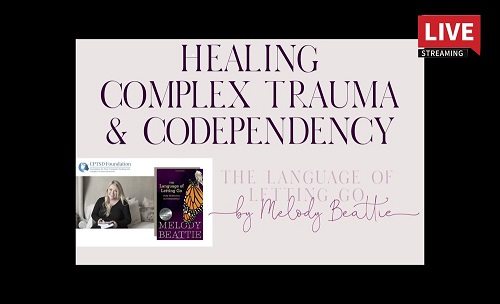Trauma-Informed Tuesday, Vol 3 Ed 36
Hello Friend,
We're always so grateful to have you on this journey with us and to be able to send out this weekly trauma-informed newsletter, just for you! Here are this weeks' resources and encouragement, we truly hope you find it helpful as you continue healing.
As always, feel free to reach out to us anytime to share your thoughts.
Remember, with any resource you come across in your trauma-recovery journey, "Take the Best and Leave the Rest".
CPTSD Awareness Day is Coming!
Register for your Early Bird Access to interviews with Kati Morton, Lisa A. Romano and more!
Register for the We Are Healing Trauma Virtual Summit.


Featured on the CPTSD Foundation Blog this week:
- Going "no contact" with toxic parents; choose your own adventure
- Off label patterns that reveal narcissism
- How I'm learning to live in the 'middle place' for my mental and physical health
- The Three C's of trauma recovery
- Is it passion or a trauma response?

This Week's Thought: "Healing also involves distancing ourselves form relationships where we find ourselves tirelessly fighting to be seen, heard, and respected. It's not selfish. It's wisdom."
- Quote by Taylor Grismore, by @SomaticExperiencingint, Instagram

Repressed Anger: The Highly Sensitive Person and Anger: Repressed anger is a pertinent topic when it comes to the relationship between the highly sensitive person and anger. Repressed anger can manifest in various forms, including depression, people-pleasing behaviours, paranoia, and passive-aggressive behaviours. Repressed anger usually stems from childhood trauma or social conditioning. A person with repressed anger might have immature or aggressive parents and was silenced, shamed or punished for expressing anger at a young age. With practice, however, one can learn to process and release repressed anger, learn from it and make the best use of it.
----------
The Difference Between Emotional Flashback and Flashback: While PTSD Flashbacks tend to get attention in books and media, many trauma survivors experience something called emotional flashbacks. Flashbacks flood brains with images, physical sensations, and a sense of re-living a trauma, but emotional flashbacks show up in the form of strong waves of emotions.

Shame is the dark powerful feeling that holds us back from reaching our potential and living a full life. Many of us have learned to attach shame to healthy behaviors that are in our best interest.
In dysfunctional families, shame can be attached to healthy behaviors like talking about our feelings, making choices taking care of ourselves, having fun, being successful, or setting boundaries.
Our guided read through of Melody Beattie’s Language of Letting Go continued last night with our community looking at how trauma survivors can face and work through their feelings to connect with their emotional center.
So, if the topics of “Letting Go of Shame”, “Rescuing Ourselves”, and “Healing Thoughts” seem interesting to you, we hope you’ll consider listening to the replay of last night’s discussion and subscribing to our channel.
Our CPTSD Community Circle Group is one of the places we connect between our Monday night discussion groups. Join us: https://cptsdfoundation.org/safe-support-groups/
PS - If you or a complex trauma survivor you know are ready to take this healing journey to the next level - Check This Out.
PPS - Remember, you can always unsubscribe anytime by using the link below. Keep in mind however that you'll miss out on the updates for current and new programs and services, including ones that you have already paid for.

